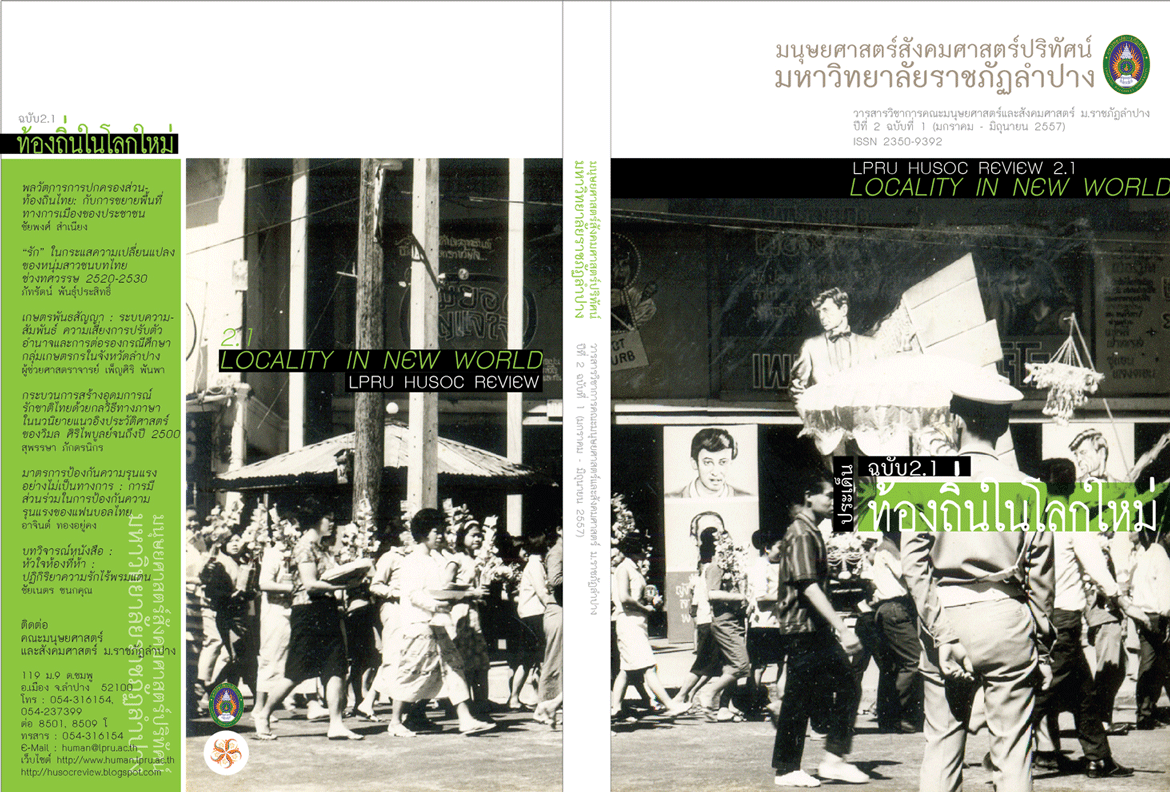“รัก” ในกระแสความเปลี่ยนแปลงของ หนุ่มสาวชนบทไทยช่วงทศวรรษ 2520-2530 / The Changing of “Love” in the Transition of Thai Rural People in the late 1977s-1987s.
บทคัดย่อ
ความเปลี่ยนแปลงของชนบทไทยในกระแสโลกาภิวัตน์ โดยเฉพาะตั้งแต่ทศวรรษ 2500 เป็นต้นมาที่ส่งผลกระทบมาถึงปัจจุบัน ส่งผลให้นักวิชาการไทย และต่างประเทศจากหลากหลายพื้นที่ทางการศึกษาได้พยายามอธิบายภาพดังกล่าว ผ่านมุมมองทางวิชาการของตน โดยมากมุ่งเน้นไปที่การพัฒนาทางเศรษฐกิจที่ส่งผลต่อคนชนบท และทำให้การมีส่วนร่วมของคนกลุ่มนี้เข้ามาสู่ทางการเมืองเพิ่มมากขึ้น อย่างไรก็ตาม งานวิจัยจำนวนมากยังละเลยที่จะพิจารณาผลกระทบ และความเปลี่ยนแปลง ที่มีต่อวัฒนธรรมทางอารมณ์และความรู้สึกของคนชนบท ทั้งที่การเข้าใจในเรื่องดังกล่าว จะมองเห็นภาพอุดมคติและความคิดของคนชนบทที่ได้รับผลกระทบจากการพัฒนาได้อย่างลึกซึ้ง
*บทความนี้เป็นส่วนหนึ่งของวิทยานิพนธ์ระดับปริญญาโท ภัทรัตน์ พันธุ์ประสิทธิ์. ความเปลี่ยนแปลงของชีวิตและความรู้สึกนึกคิดของผู้หญิงชั้นกลางระดับล่าง ตั้งแต่ช่วงทศวรรษ 2530 ถึงปัจจุบัน วิทยานิพนธ์ศิลป ศาสตรมหาบัณฑิต สาขาวิชาประวัติศาสตร์ มหาวิทยาลัยเชียงใหม่, 2556.
บทความนี้ จึงเป็นการพยายามตอบคำถามความเปลี่ยนแปลงด้านความรัก และการหาคู่ครองของคนชนบทไทยช่วงทศวรรษ 2520-2530 ท่ามกลางการอพยพย้ายถิ่นฐานและการเลื่อนสถานภาพ รวมไปถึงความเปลี่ยนแปลงของสังคมและเศรษฐกิจรอบตัวของกลุ่มคนเหล่านี้ ผ่านทางสื่อสิ่งพิมพ์ที่คนชนบทอ่าน และเป็นพื้นที่ในการแสดงออกทางความรู้สึกและความต้องการของตน อย่าง นิตยสารคู่สร้างคู่สม ที่ถือว่าเป็นนิตยสารที่มีชื่อเสียง และได้รับความนิยมจากคนชนบทในยุคแรกเริ่มจนถึงปัจจุบันอย่างต่อเนื่อง โดยคำถามหลักของบทความ คือ
1. การเปลี่ยนแปลงทางเศรษฐกิจไทยช่วงการพัฒนาในทศวรรษ 2520-2530 ส่งผลอย่างไรต่อชีวิตคนชนบท 2. การขยายตัวของนิตยสารในฐานะพื้นที่ในการเรียนรู้โลกของคนชนบท สัมพันธ์อย่างไรกับการเปลี่ยนแปลงภายในชนบท 3. ความเปลี่ยนแปลงในชนบทส่งผลต่อความรัก และการหาคู่ครองของหญิงชายชนบทอย่างไร เพื่อนำไปสู่ความเข้าใจอย่างลึกซึ้งต่อการพัฒนาทางเศรษฐกิจและสังคมของไทยในช่วงทศวรรษ 2520-2530 ที่ส่งผลอย่างหลีกเลี่ยงไม่ได้ต่อความสัมพันธ์ภายในครอบครัว โดยเฉพาะผู้หญิงและผู้ชาย รวมถึงรอยแยกของชนบทไทยอันเกิดมาจากการเลื่อนสถานภาพ และการศึกษาที่ทำให้เกิดกลุ่มคนที่แตกต่างหลากหลายมากขึ้น โดยทั้งหมดได้สะท้อนผ่านปรากฏการณ์ความนิยมของคอลัมน์และการหาคู่ครองผ่านทางจดหมาย
The transformation of Thai rural life in the post-war period, which has been dramatically influenced by economic development, has attracted the concentrated attention of both Thai and foreigner scholars. Most researchers focus on the effects of economic development on the Thai rural population and try to answer the question of why and how this lead to increased participation by the Thai rural population in the political sphere, demanding improved living and economic conditions. However, these investigations have neglected the investigation of how economic development affected the mental life of rural people. An understanding of this will provide important insights into this group of people at a time of transformation in Thai society.
This paper therefore analyses changes in how love and the search for relationships were re-conceptualized by Thai rural people in the decade from the late 1970s, a period of migration and of changes in the social and economic environment in which the rural population moved. These changes were made evident in print media, in particular “Koo Saang Koo Som” magazine. The three questions addressed by this paper are therefore: (i) How did economic changes between 2520 and 2530 BE (1977-1987 CE) reshape the ways of life of rural people? (ii) What was the relationship between the increasing role of magazines as sources of knowledge for rural people and these changes in rural life? (iii) How were these changes related to changes in conceptualizations of love and in relationships between heterosexual partners. It is hoped that answers to these questions will lead to a better understanding both of these profound economic and social transitions and of fractures in and stratification of rural populations (through, for example, increasing access to higher education).
________________________________________
*This article comprises a part of the thesis Transition of Life and Mentality of the Lower Middle Class Women from the late 1980s to the Present, submitted by Pattarat Phantprasit in completion of a Master of Arts degree in History, Chiangmai University, 2013.



